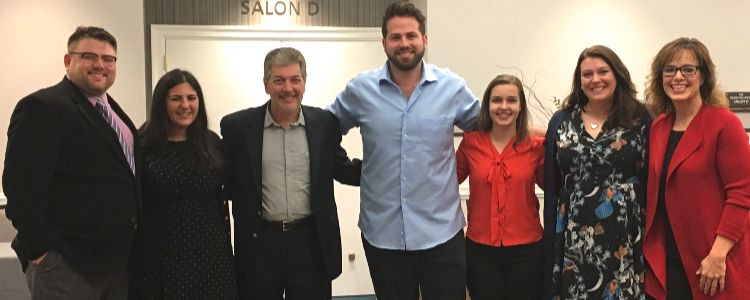BEDA/NEDA Conference Recap – Part 2!
Yesterday marked the final day of the Binge Eating Disorder Association (BEDA)’s National Conference in partnership with the National Eating Disorders Association (NEDA). Titled “Building Resilient Communities Through Collaboration,” the conference united survivors, caregivers, and treatment professionals for vital conversations about binge eating disorder (BED), body image and weight shaming, and marginalized communities.
Life After ‘The Biggest Loser’
One of the day’s highlights included a special session titled “Life After NBC’s ‘The Biggest Loser’: The Experiences and Perspectives of Former Reality TV Contestants” featuring Darren Moore, PhD, LMFT and Kai Zwisteria, a former contestant on the show. Zwisteria detailed her experiences of being shamed on the show, claiming that higher weight individuals were “tempted” and subsequently filmed giving into temptation, perpetuating stigma against higher weight bodies. She claimed that the show traumatized contestants through tactics such as contrived drama, extreme weight loss measures, and isolation from family and friends.
Additionally, some strangers even felt ownership over her body, even approaching her in the supermarket questioning her food choices. Zwisteria also expressed concern about the lack of aftercare provided after the cameras stopped rolling.
Most troublingly, Dr. Moore and Zwisteria found that most contestants they spoke to would take part in the show again if offered the opportunity. Some of the reasons include internalized fat phobia and lower socioeconomic status. Though many recognize The Biggest Loser’s predatory nature, some former participants may feel as though “something” is better than nothing and are even willing to go through retraumatization instead of facing weight stigma.
“There is something inherently wrong with connecting drastic weight loss measures to winning a cash prize,” Zwisteria said. Besides being predatory, The Biggest Loser may also increase fat bias and actually discourage people to exercise, according to various studies.
Public Policy Matters
During the afternoon, conferencegoers attended a general session called “Prioritizing Public Policy: Where the Eating Disorders Field Stands and Where We Go from Here,” which featured Kerry Donohue, our Public Policy Manager. Panelists discussed ways that our united voices can make a difference.
Said Chase Bannister, MDIV, MSW, LCSW, CEDS (EDC): “There is a world of difference between insisting on someone doing something and creating an atmosphere that nurtures us to want to do something.” Panelists encouraged audience members to think about ways to build lasting relationships and motivate community members to create change.
As Donohue pointed out, fighting weight stigma is something we can all work on at the state level. Oftentimes, what gets attention in one state can spread to other states and federal law can start as a multitude of state laws. Moreover, it can be easier to build relationships with state legislators and grassroots coalitions in states can be incredibly influential. If you’re interested in getting involved in NEDA’s legislative advocacy efforts, click here to learn more.
Elissa Meyer of Academy for Eating Disorders (AED) called upon the audience to master our numbers and messages, putting what we are asking for in terms of impact. Eating disorders are an international human problem and we must speak with one united voice.
Meanwhile, Sondra Solovay, JD advocated for reframing weight stigma as a civil rights issue rather than a health problem and reframing disability as a socially-constructed problem. Before the Affordable Care Act (ACA), people were denied healthcare because of pre-existing conditions, and the precarious future of the ACA is worrisome. Additionally, workplace wellness programs stigmatize people based on weight and put pressure on people to move their bodies in ways that could feel detrimental to them.
Marginalized Communities Speak Out
Later in the afternoon, the discussion around marginalized populations continued with a session titled “What Are You Hungry For? Black Women with Eating Disorders on Predominantly White College Campuses,” presented by Charlynn Small, PhD, CEDS and Mazella Fuller, PhD, LCSW, CEDS. As Dr. Small pointed out, the biggest misconception is that black women don’t get eating disorders. Additionally, most measures used to detect eating disorders are not developed with black women in mind.
Black women continue to grapple with issues around their skin tone, hair, and body shape, which Dr. Small said are remnants of slavery. Additionally, the community faces a lack of food availability and a lack of food quality, single motherhood, issues with father/daughter relationships, and higher rates of physical, emotional, and sexual abuse. These factors may contribute to the development of eating disorders, particularly BED, in the community. Black women also continue to experience both overt and subtle forms of racism and the impact of these microaggressions are not reflected by assessment measures.
Dr. Small powerfully stated: “Black women are hungry for equity. Black women staff at predominantly white colleges are hungry for their credentials to be respected. Black women students are hungry for merit scholarships, internships and externships, and an opportunity to be seen as someone who earned the right to be at these institutions. Black women are tired of being the spokesperson for all things black. And black women are hungry for understanding.”
With the myriad issues young black women face, it’s time for professionals to start listening. As Dr. Fuller pointed out, you won’t always get it right. In those moments when you miss the mark, acknowledge it, apologize, and move on. What’s important is that you’re having the conversation.
NEDA’s Family Panel Fearlessly Share Their Stories
The BEDA Conference in partnership with NEDA concluded with NEDA’s Family Panel, in which Joey and Patty Julius, Ryan Sheldon of Confessions of a Binge Eater, Stacey Lorin Merkl of Realize Your Beauty, and NEDA Senior Program Associate Chelsea Kronengold bravely shared their eating disorder recovery stories. While Joey Julius detailed his recovery process as an athlete in the public eye, Patty Julius explained what it was like to watch her son struggle and the frustration she felt over not being able to fix his issues.
Sheldon detailed what it was like to spend most of his income on food and how finally getting a diagnosis of BED lifted much of the shame he was feeling. Meanwhile, Merkl discussed how some of her feelings of isolation were lifted when she started volunteering with NEDA. Finally, Kronengold touched upon the relationship between mother and daughter when both struggle with BED.
Click here for a full list of the conference’s informative sessions and remember: you can always follow the action on social media by searching #BEDA2017 and #BEDANEDA!
This year’s conference was again a huge success and we want to thank BEDA and the presenters, attendees, and all of the dedicated volunteers who helped ensure that the conference ran smoothly!
Diana Denza is a 2011 Fordham University graduate and NEDA’s senior communications associate.





